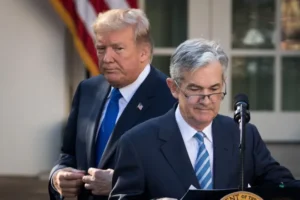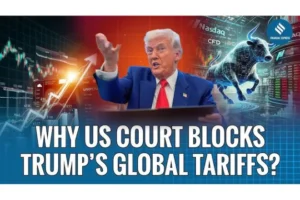The dramatic saga of President Donald Trump's trade policies took a significant turn this week as a U.S. trade court invalidated the majority of his imposed import duties. This landmark decision sent ripples through financial markets, sparking an immediate appeal from the administration and igniting a rally in U.S. stock-index futures. For businesses, investors, and global trade partners, understanding the implications of this ruling on these duties is paramount. Let's delve into what happened, the market's reaction to these unexpected developments regarding trade duties, and what we can anticipate next in the ongoing debate surrounding global trade.
The Court's Ruling: A Blow to Unilateral Trade Measures
Late Wednesday, the Court of International Trade in Manhattan delivered a decisive blow to the Trump administration's broad application of these import duties. The court sided with a coalition of small businesses and Democratic-led states, ruling that President Trump had exceeded his executive authority in imposing these widespread levies. Central to the court's decision was the administration's reliance on the International Emergency Economic Powers Act of 1977 (IEEPA) to justify the measures. The IEEPA, the court found, does not explicitly grant the president the power to levy such duties.
The U.S. Constitution unequivocally delegates the power to set such duties to Congress. While Congress has, over the years, delegated specific authority to the president for duties in certain circumstances (such as trade-treaty violations), the fundamental question before the court was whether the IEEPA conferred upon President Trump the power to impose unlimited duties on goods from virtually every nation. The three-judge panel was unequivocal: "The court does not read IEEPA to confer such unbounded authority and sets aside the challenged duties imposed thereunder."
This pivotal ruling directly impacts Trump's blanket 10% duties on trading partners, as well as the so-called reciprocal duties and those linked to fentanyl enforcement against Canada, Mexico, and China. It's crucial to note, however, that import duties on steel and aluminum, enacted under different legal authority, remain unaffected by this decision.

Market Reaction: A Sigh of Relief and Soaring Futures
Financial markets have long been on edge when it comes to trade duties, with U.S. stocks, in particular, demonstrating extreme sensitivity to the imposition or even the threat of sky-high levies against major trading partners. President Trump's tendency to soften or delay these measures has often triggered market rebounds.
Unsurprisingly, this ruling against widespread duties ignited a sharp surge in equity futures. S&P 500 futures (ES00) climbed 1.7% by 11 p.m. Eastern, while futures on the Dow Jones Industrial Average (YM00) jumped over 550 points (1.3%), and Nasdaq-100 futures (NQ00) gained 2%. Should these gains hold, major indexes are poised to extend their strong May performance, having already recouped the steep selloff that pushed the S&P 500 SPX to the brink of a bear market following Trump's April 2 rollout of sweeping "reciprocal" duties.
For many investors, this decision regarding trade duties wasn't a complete shock. The possibility of a ruling against President Trump had been considered a potential market risk. Stephen Innes, managing partner at SPI Asset Management, encapsulated the sentiment, stating that Wednesday night's move was "the market exhaling after weeks of white-knuckle volatility sparked by trade war brinkmanship."
The prolonged uncertainty surrounding these duties had fueled anxieties about potential inflation and and economic slowdown. Trump's subsequent delays on many duties helped to instigate a recovery. Just last Friday, Trump had threatened a 50% duty on imports from the European Union starting June 1, causing stocks to dip. However, he then pushed back the deadline to July 9 after the E.U. agreed to accelerate talks, contributing to a significant rebound on Tuesday. Innes emphasized the broader significance, noting, "This ruling is more than just a legal footnote. It's a structural pivot in the narrative: from strongman duties to institutional guardrails." He added, "And traders, ever the momentum-chasing species, are already front-running the unwind" of these trade measures.

What's Next: Uncertainty Lingers Despite Ruling
While the court's ruling offers a degree of clarity, it is far from the final word. The decision casts a shadow of uncertainty over ongoing trade talks between the U.S. and numerous global trading partners.
Aniket Shah, a strategist at Jefferies, pondered the implications, asking, "How will China, Japan, the E.U., India, and the U.K. respond to this news?" He suggested that a reason bilateral negotiations had stalled was perhaps an anticipation of this very outcome regarding these duties. It remains unclear whether these nations will now perceive trade negotiations as a matter to be resolved by the courts or if they will re-engage with Washington on broader trade policy.
Furthermore, the question remains whether the administration will explore alternative legal avenues to implement duties. Shah pointed out, "Does the administration have alternative legal pathways to impose duties aside from invoking IEEPA? Could it use Section 232, 301, or 201 to implement duties?" These alternative legal frameworks could potentially be invoked to impose new import levies.
Meanwhile, investors must now contend with the uncertainty surrounding an appeal to the Supreme Court. Analysts at Renaissance Macro Research noted on X, "As this ruling gets appealed, it will prolong the uncertainty that's presently weighing on business investment." They also reminded investors of the "TACO" acronym (Trump Always Chickens Out), but cautioned that Trump "usually follows through on at least some of his duty threats." The crucial takeaway: "If Trump wins on appeal, duties likely return." The future of these trade measures, and indeed global trade, remains a subject of considerable speculation.
Conclusion: Navigating the Evolving Trade Landscape
The U.S. trade court's decision marks a significant moment in the ongoing narrative of global trade. While it offers a temporary reprieve for some businesses and a boost to market sentiment, the path forward remains complex and uncertain. The immediate market rally highlights the eagerness for stability, yet the impending appeal to the Supreme Court ensures that the conversation about import duties and executive authority is far from over.
See more information here:
- Trump Delays EU Tariffs to July 9 – EUR/USD Breaks Higher as Market Reacts Like a G7 Shock
- EU-US trade talks in focus – rising tensions shake the Forex market
- Why Goldman Sachs Says Tariff Price Hikes and Inflation Won’t Trigger a Surge
For companies like H2T Finance, staying abreast of these Breaking News developments is crucial. As a company dedicated to providing insightful financial analysis and strategic guidance, we understands that shifts in trade policy can have profound impacts on market dynamics and investment opportunities. We continuously monitor such rulings and their potential ripple effects to help clients navigate volatile periods and make informed decisions. The evolving landscape of international trade demands constant vigilance, and committed to providing the expertise needed to help clients thrive in these dynamic conditions.
About H2T Finance
H2T Finance’s Breaking News delivers real-time financial news, keeping you up to date with market movements, policies, and global economic events. As part of H2T Media Group, we are committed to providing accurate information and in-depth analysis, helping investors make quick, confident decisions in an ever-changing financial landscape.
For inquiries or personalized assistance, feel free to contact us:
📞 Phone: +84933.948.888
📧 Email: info@h2tmediagroup.com
💻 Website: https://h2tfinance.com/
📍 Address: 4/567 Tổ 10 Khu Phố Hòa Lân 1, Thuận An, Bình Dương, Vietnam
At H2T Finance, your success is our priority.


